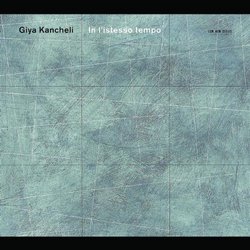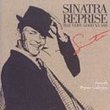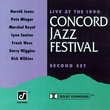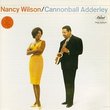| All Artists: Giya Kancheli, Kremerata Baltica, Bridge Ens Title: In L'Istesso Tempo Members Wishing: 2 Total Copies: 0 Label: ECM Records Release Date: 3/22/2005 Genre: Classical Styles: Chamber Music, Historical Periods, Classical (c.1770-1830), Instruments, Electronic Number of Discs: 1 SwapaCD Credits: 1 UPC: 028946181829 |
Search - Giya Kancheli, Kremerata Baltica, Bridge Ens :: In L'Istesso Tempo
 | Giya Kancheli, Kremerata Baltica, Bridge Ens In L'Istesso Tempo Genre: Classical
|
Larger Image |
CD DetailsSimilarly Requested CDs |
CD ReviewsThe Music of Existence Daniel R. Greenfield | Milwaukee, Wisconsin, United States | 01/15/2006 (5 out of 5 stars) "The recent release of Giya Kancheli's music on the ECM New Series label (In l'istesso tempo), featuring Gidon Kremer, has been keeping me spellbound of late. This is not the kind of music that you would listen to on your way to work, however. It is for after hours, when you have finished with the day's demands and are able to relax quietly with a glass of wine and no outside disturbances. You will turn the lights down low (or even shut them off entirely) when listening to such music, as the entire experience is meant for the sense of hearing.
Kancheli's music is idiosyncratic. If I had to compare him to any other modern-day composer it might be Arvo Pärt in that both composers possess a minimalist approach. But they differ beyond this initial resemblance. Pärt's music possesses a very spiritual outlook on life, whereas Kancheli's is a more darkly existentialist view. In trying to come to terms with Kancheli's style and approach, Wolfgang Rathert's album notes are most enlightening. Rathert finds the essence of the so-called new music which characterized the Second Viennese School was less an emancipation of dissonance and more an absolute claim to subjectivity and expressiveness. He also characterizes the "autonomy of sound" as the primary characteristic of the new music. Though the advent of the First World War brought a hiatus in the development of this new musical language, "it fundamentally changed the idea of what music was." According to Rathert, "the genesis of new music raised fundamental questions" which every serious composer since that time has been forced to address. So the "end of the new music cannot be proclaimed, though there is no doubt an ongoing productive crisis." One the results of this great sea-change in music has been that composers must actively take a position with respect to the new political and social realties of the modern world. Even those composers who take the solipsistic head-in-the-sand approach are in effect making a statement. There is no way for a composer to avoid doing this. There is now a blurring of schools and artistic norms. It is difficult to pin a composer down in terms of any one style or region. Rathert characterizes Kancheli's music as "an archaic sort of modernity whose archaisms have an avant-garde feel." Even so, his music "eludes characterization." I suppose you might say it is shaped by a world-weary attitude, the reactions of a sensitive soul to the bloodshed and conflicts of the "civilized" world. As Kancheli writes, "I write fundamentally for myself, without harboring any illusions that beauty will save the world." Kancheli views the disappearance of the "religion of tonality" (which bespoke an inherent meaning and dignity to life) as "the sign of a terrible loss", something to be mourned but that is never to be regained. According to Rathert, Kancheli "confronts this loss, not with the complex means of the avant-garde, but with a language of very simple means and gestures, which keeps the memory alive while embodying protest." This protest is exhibited partly by his "refusal to use fast tempi". Thus slow tempi dominate all three works on this album, as evidenced by the title of the Piano Quartet "in l'istesso tempo". Rathert summarizes: "The overall impression of Kancheli's music is one of philosophical distance and almost Far Eastern calm. Its 'things as they are' stance ... leaves listeners with no choice but to continually address their own inner thoughts." And this "dissenting stance" seems to adhere in all of Kancheli's works: a first encounter with his music may even strike one as being somewhat arrogant and uppity. One does come away with the occasional feeling that he is in his music turning the tables on the listener, forcing the listener to find the meaning of the music within his/her own subjective world, as "vestiges of the unsaid may contain the promise that potentially resides in every new tone, as if it were the first one that had ever sounded. "" |

 Track Listings (3) - Disc #1
Track Listings (3) - Disc #1



